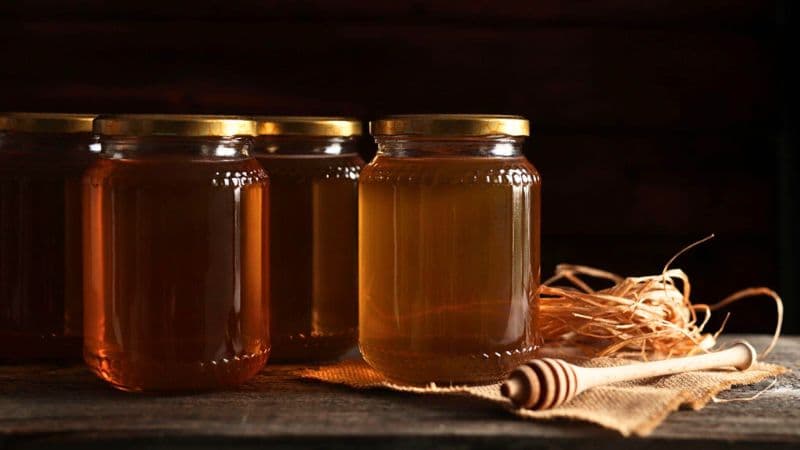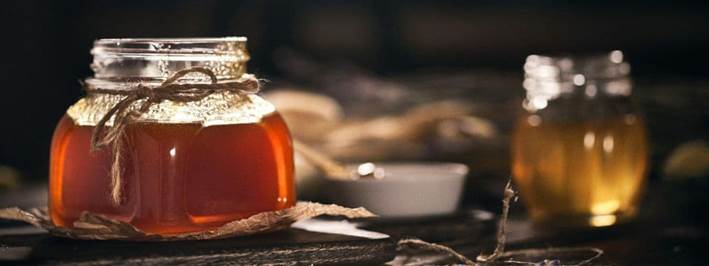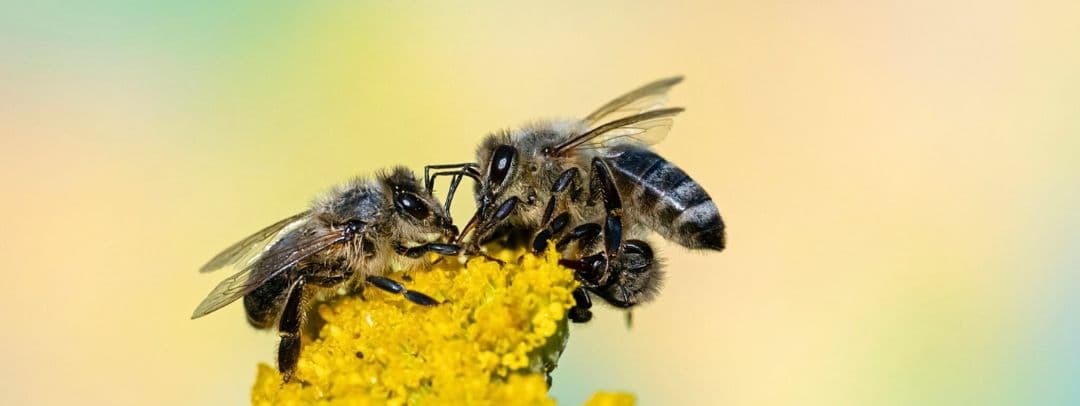Bee honey is a food rich in beneficial properties for health. Since ancient times, honey has been used to heal wounds and treat diseases. Regardless of the way we use it, whether ingested or topically, the properties and benefits of honey for human health are very broad.
Thus, the composition of bee honey makes it a healthy, nutritious and delicious food, rich in nutrients and antioxidant properties.
Index of contents
- Properties and benefits of honey bees
- What does honey taste like?
- The coloring of honey from bees
- Composition of honey
- Physiological benefits of honey
- Types of honey
- Can honey be taken daily?
- How to store honey
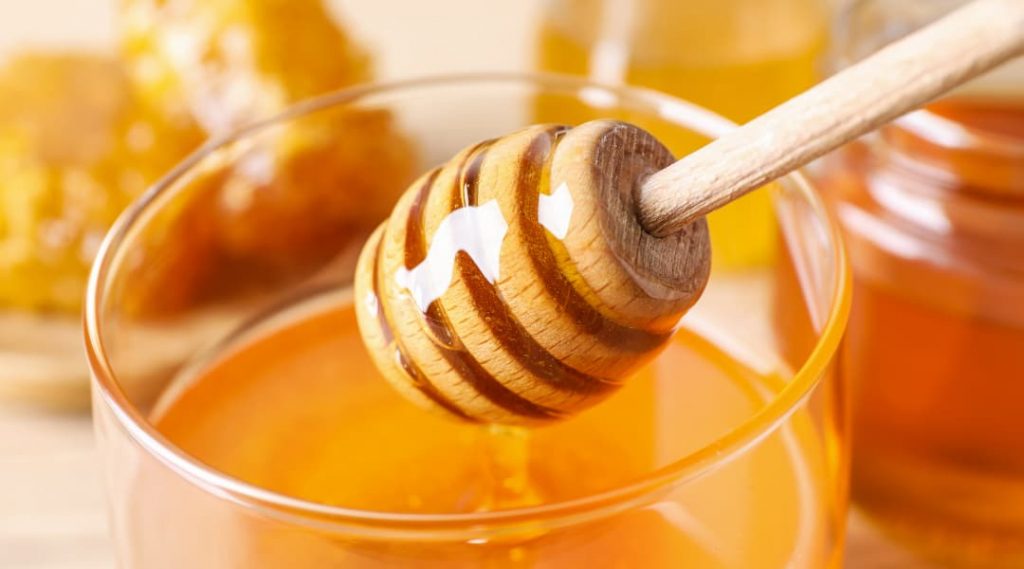
Properties and benefits of honey bees
Honey is much more than a natural sweetener. It is a functional food, whose benefits go beyond those of basic nutrition. It is rich in antioxidants, antibacterial and with a strong moisturizing power. In its composition stand out:
- Minerals such as calcium, zinc, magnesium, iron, potassium, copper or phosphorus
- B group vitamins, vitamin C, D and E
- Organic acids
What does honey taste like?
Many people think that honey has a characteristic and specific flavor, known to all. However, the taste of honey can vary considerably depending on the varieties of flowers used in its preparation.
In addition, depending on whether it is a monofloral or multifloral honey, its flavor can also vary considerably. Thus, its flavor can range from the mildness of acacia honey, to the intensity of forest honey. It can have floral, fruity or even woody undertones.
Depending on the type of honey or the type of flower, you can even distinguish a specific flavor. The wide variety of honeys that we can find, each one of them, with a characteristic flavor is surprising. Thus, depending on its flavor, we can find different types of honey
- Floral
- Fruity
- Vegetable
- Aromatic
- Chemical
- Animal
- Warm
The coloring of honey from bees
Like the flavor, the color of the honey will vary depending on the flower or flowers used in its preparation. Although it is not known exactly what the color of the flower nectar depends on, there is evidence that this element is decisive in the color that the honey will finally have.
Elements such as plant pigments or minerals obtained from the soil can influence the color of pollen, although they are probably not the only ones..
Composition of honey
Honey is mainly composed of fructose (38%), glucose (31%) and water (18%). In addition, it usually contains sucrose, maltose and other sugars. It is a combination of plant-based sugars with water.
But it is also made up of proteins and amino acids, between 0.2% and 2%, and contains vitamins, enzymes, hormones, organic acids and minerals.

Despite its high sugar content, it is a great source of healthy energy taking the recommended daily amount.
Contains vitamins A, E, K, B1, B2, B6, Niacin, Vitamin C, pantothenic acid (B5), phenolic acids, fatty acids, apigenin, acacetin, abscisic acid, ferulic acid and carotenoids.
All these components make it a complete, energetic food that is highly recommended for people who want to have a healthy diet.
Physiological benefits of honey
There are multiple studies that support the beneficial properties of honey. Dr. Ron Fessenden, retired physician and chairman of the United States Committee for Honey and Health, specializes in the physiological benefits of honey.
Thus, through his lectures, Dr. Ron Fessenden defends the benefits of honey for people, such as improving sleep, treating wounds or controlling blood sugar.
Honey relieves cough and sore throat
One of the most widespread uses of honey is undoubtedly the relief of throat discomfort and its use to alleviate coughs.
For many years, this natural sweetener has been used to prevent and combat the symptoms of colds and flu; as well as some infections.

Honey lowers blood sugar levels
Although many people think otherwise, the truth is that honey regulates blood sugar levels. This is thanks to the balance between glucose and fructose levels.
The fructose potion makes it easier for the existing glucose to be taken up by the liver, creating what is called glycogen. This is a substance that is abundant in the liver and muscles of the body, and when the body needs it, it can be converted into glucose.
In this way, glycogen passes to the heart, brain, kidneys and red blood cells. Thus, various studies state that honey hardly increases blood sugar levels or insulin levels.
Honey promotes sleep recovery
Honey not only reduces stress, but there is also plenty of research that claims honey helps promote sleep. By taking it before bed, our body stores glycogen in the liver and delivers it to our body when needed by the brain.
This is thanks to the glucose present in honey, which causes the brain to produce a smaller amount of orexin, a substance related to insomnia, thus facilitating the development of sleep.
Thus, honey facilitates relaxation and sleep. A glass of milk with honey before bed helps promote sleep. Also, the melatonin present in honey regulates heart rate and tissue rebuilding at night.
Honey reduces metabolic stress
Any type of stress, regardless of whether its origin is emotional, physiological or psychological, is translated in the body as metabolic stress. This concept is based on an organic process that allows you to gain muscle mass. In other words, this process leads to muscle hypertrophy.
Honey naturally produces glycogen in the liver, which hinders the release of stress hormones throughout the day.
However, honey not only helps control stress, but also, thanks to sugar, it also promotes concentration.
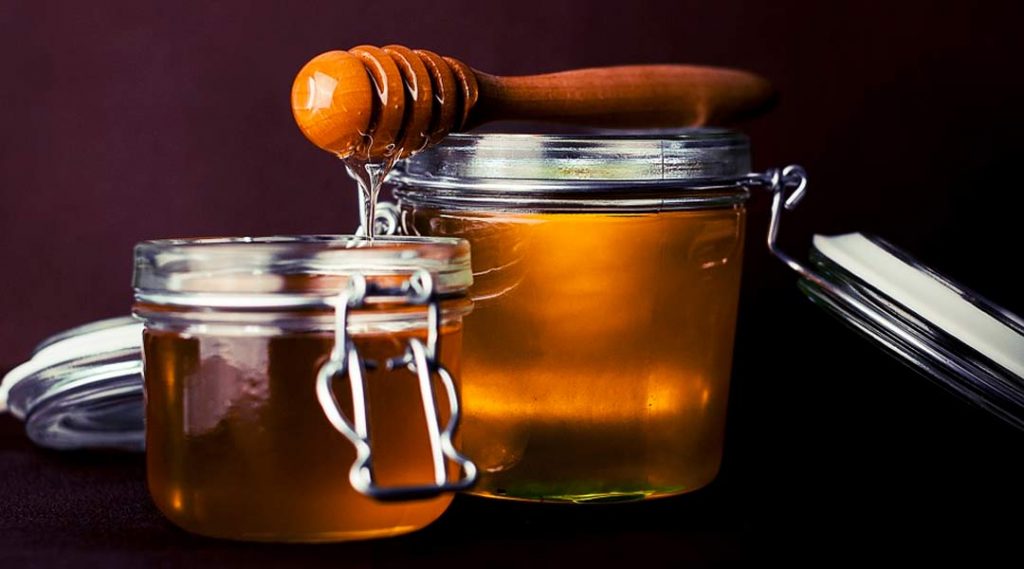
Honey fights constipation
Being a prebiotic food, bee honey contributes to the improvement of the bacterial flora in a natural way. In this way, it helps improve the digestive health of our body.
This laxative effect of honey is mainly due to fructooligosaccharides (FOS), which work in a similar way to fiber and create a mild laxative effect.
Benefits of honey from bees in the brain
Do we need a good dose of energy? Honey from bees can be the solution. It is an incredible source of natural energy, which easily penetrates our bloodstream and provides us with the energy we need quickly.
In addition, being a highly energetic food, its consumption helps to activate our brain and enhance concentration.
Honey treats wounds and burns
The beneficial properties of honey have been known for many years. In fact, until the middle of the 20th century, this natural remedy was used to heal wounds and infections.
Thus, honey from bees helps to clean and disinfect wounds and sores caused by some bacteria. This is because, through an enzymatic process, honey releases hydrogen peroxide, which explains its antiseptic qualities.
Types of honey
We can find two large groups of honey: monofloral honeys and flower, multifloral or milfloral honeys.
- Monofloral honeys they are made mainly from the nectar of a single flower. We can find within this group a wide variety of honeys: orange blossom honey, acacia honey, rosemary honey, etc. Each variety of honey has unique properties and characteristics, different aromas, flavors and nuances.
- Flower honey, multifloral or 1000 flowers: are those honeys that are made from the combination of pollen from different types of flowers.

Can honey be taken daily?
Honey is often used as a natural sweetener. There is no specific amount of honey recommended. However, due to its sugar levels, its consumption is recommended in a moderate way.
The World Health Organization (WHO) recommends that free sugars should not account for more than 10% of a person’s daily energy intake. In an adult who needs 2000 kcal per day, 10% is around 200 kcal of free sugars. In case of being the only source of sugar, this would be equivalent to 60 grams of honey.
In addition, in a healthy person, it is recommended to consume at most a small spoonful of honey per day. This is approximately 10 to 12 grams of honey. It is clear that everything will depend on the type of diet of each person and the amount of sugars that are taken daily.
Other factors to take into account when consuming honey on a daily basis is the physical exercise that is carried out, the metabolism of each person and if they suffer from any illness or disease that honey can help treat.
Thus, among the benefits of consuming honey daily we find:
- Skin care
- Control of cholesterol levels
- Strengthening of the heart
- memory enhancement
- sleep improvement
- calm the nerves
- protect the stomach
How to store honey
- Always keep it in glass containers. This way it will not be impregnated with odors or attract insects. It is also recommended that the bottle be closed.
- Suitable temperature. It should never be refrigerated and it is recommended to store it in a place where it does not receive sun.
- It is possible to freeze it. If you have a considerable amount of honey, freezing it can be a good option and thus it will not lose its properties. To thaw it, we recommend the well-known bain-marie method, since it is not recommended to wait for it to thaw at room temperature.
You may also be interested in:

